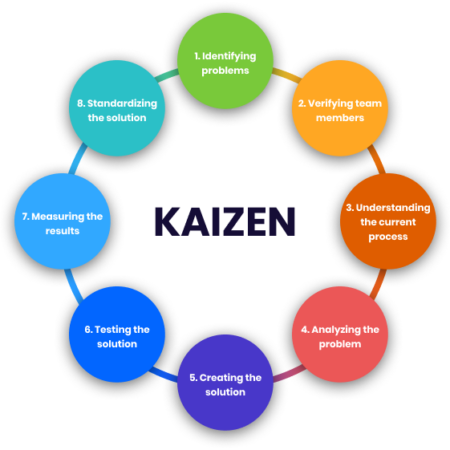Kaizen Process
(Redirected from Kaizen)
Jump to navigation
Jump to search
A Kaizen Process is a continuous improvement process that involves significant employee participation to contribute to their company’s development.
- Context:
- It can focus on distributed discovery of Problem Solutions.
- …
- Counter-Example(s):
- See: The Toyota Way, Continual Improvement Process, Supply Chain, Lean Manufacturing.
References
2023
- (Wikipedia, 2023) ⇒ https://en.wikipedia.org/wiki/Kaizen Retrieved:2023-8-19.
- is a concept referring to business activities that continuously improve all functions and involve all employees from the CEO to the assembly line workers. Kaizen also applies to processes, such as purchasing and logistics, that cross organizational boundaries into the supply chain. It has been applied in healthcare, psychotherapy, life coaching, government, manufacturing, and banking. By improving standardized programs and processes, kaizen aims to eliminate waste and redundancies (lean manufacturing). Kaizen was first practiced in Japanese businesses after World War II, influenced in part by American business and quality-management teachers, and most notably as part of The Toyota Way. It has since spread throughout the world and has been applied to environments outside of business and productivity. [1]
2019
- (Wikipedia, 2019) ⇒ https://en.wikipedia.org/wiki/Kaizen Retrieved:2019-1-25.
- is the Japanese word for "improvement". In business, kaizen refers to activities that continuously improve all functions and involve all employees from the CEO to the assembly line workers. It also applies to processes, such as purchasing and logistics, that cross organizational boundaries into the supply chain. It has been applied in healthcare, psychotherapy, life-coaching, government, and banking. ...
- ↑ Europe Japan Centre, Kaizen Strategies for Improving Team Performance, Ed. Michael Colenso, London: Pearson Education Limited, 2000
2018
- https://www.4industry.com/continuous-improvement/
- QUOTE: Stemming from two Japanese words — “Kai” meaning “improvement” and “Zen” meaning “good” — Kaizen translates to “continuous improvement” and is applicable to many areas of life, including professional and personal development. As the basis of the lean manufacturing strategy, it seeks to remove as much waste as possible from production processes, improve product quality and increase profits.
Kaizen seeks to engage all workers in a company’s continuous improvement process, encouraging them to look for, suggest and implement new ideas that can improve some aspect of the factory floor. As a step-by-step plan of action, it includes the organization of workshops dedicated to identifying, implementing and following up on areas of improvement within the company. Typically, these meetings involve the following steps, which can become more involved with larger or more complex problems:
- Identifying problems
- Verifying team members
- Understanding the current process
- Analyzing the problem
- Creating the solution
- Testing the solution
- Measuring the results
- Standardizing the solution

- QUOTE: Stemming from two Japanese words — “Kai” meaning “improvement” and “Zen” meaning “good” — Kaizen translates to “continuous improvement” and is applicable to many areas of life, including professional and personal development. As the basis of the lean manufacturing strategy, it seeks to remove as much waste as possible from production processes, improve product quality and increase profits.
2003
- (Brunetaul & New, 2003) ⇒ Adam P. Brunetaul, and Steve New. (2003). “Kaizen in Japan: An Empirical Study.” International Journal of Operations & Production Management
- ABSTRACT: This paper reports the study of kaizen as practised in a selection of Japanese companies. After discussing the general understanding of kaizen and proposing a clear definition, the paper describes the methodology of the study, and presents findings from the research, taking Nippon Steel Corporation (NSC) as a base model and comparing this with the data from other companies. The development of kaizen activity in NSC is presented together with a description of the current nature of kaizen, which is compared with other firms in the steel and automotive industries to assess uniformity. The paper concludes that kaizen evolves uniquely within each organisation, following changes to the organisation's business environment. Detailed implementations vary considerably between organisations, but all rely on kaizen to achieve targets as an integral element in the operations management system. This yields insights into kaizen's sustainability, and points to its vulnerability to external economic conditions.
- QUOTE: ... Kaizen is the Japanese word for improvement, carrying the connotation in industry of all the uncontracted and partially contracted activities which take place in the Japanese workplace to enhance the operations and the environment. Kaizen epitomises the mobilisation of the workforce, providing the main channel for employees to contribute to their company’s development. In isolation, the concept seems simple: “with every pair of hands, you get a free brain” (Bessant, 2000). ...